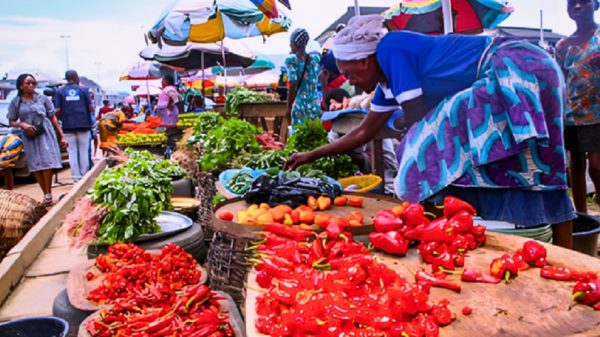Central Bank of Nigeria (CBN) continued financing of the government’s fiscal deficit is limiting the impact of its longest phase of monetary tightening since 2011 as rising money supply drives inflation to an almost 18-year high, according to a report in Bloomberg.
Annual inflation in Africa’s biggest economy quickened to 22% in March from 21.9% in February, the statistics agency said Saturday, even after the Central Bank of Nigeria hiked its benchmark rate by 650 basis points since May.
The hawkish stance has failed to curb a sustained rise in money supply and credit to the economy that are both at a record high.
While raising rates, policymakers have also funded budget shortfalls to the tune of 23.7 trillion naira ($51 billion) in eight years, putting pressure on money supply.
The monetization of the deficits, high global commodity prices, a weakening currency and floods that destroyed thousands of farmlands last year have all contributed to the upward trend in inflation, according to the World Bank.
Money supply, or M2, rose 18.3% in February from a year ago, while credit to businesses and consumers increased 16%.
Both contributed to push total money supply in the economy to 53.3 trillion naira and credit to the private sector to 41.8 trillion naira, the highest on record, according to data on the central bank’s website.
“CBN’s ways-and-means financing of Nigeria’s fiscal deficit has played some role in the expansion of monetary aggregates,” said Razia Khan, head of research for Africa and the Middle East at Standard Chartered Bank. “Even with rate-tightening, this might be a better gauge of the overall stance of monetary policy.”
Inflation has been above the central bank’s 9% ceiling for almost eight years. Governor Godwin Emefiele said at the monetary policy committee briefing in March that it will continue tightening, albeit moderately, until the differential between price growth and the key lending rate — at 18% — is closed.
Undermining goals
Consumer prices climbed an average 18.8% for 2022, a 21-year record, the World Bank said in its latest global report. Food inflation “is estimated to have pushed five million Nigerians into poverty,” it said.
The Abuja-based central bank is undermining its own goals by the “continued financing of government’s fiscal deficit,” as well as bank rules such as the “minimum loan-to-deposit ratio that banks must maintain to limit excessive cash-reserve-ratio debits,” said Ayodeji Dawodu, head of Africa sovereign and corporate credit research at BancTrust & Co.
The regulator demands that lenders must hold 32.5% of deposits as reserves, and extend at least 65% of the deposits as loans, to avoid penalties.
The central bank’s tightening measures “have not been effective,” Dawodu said.
![]()




























































